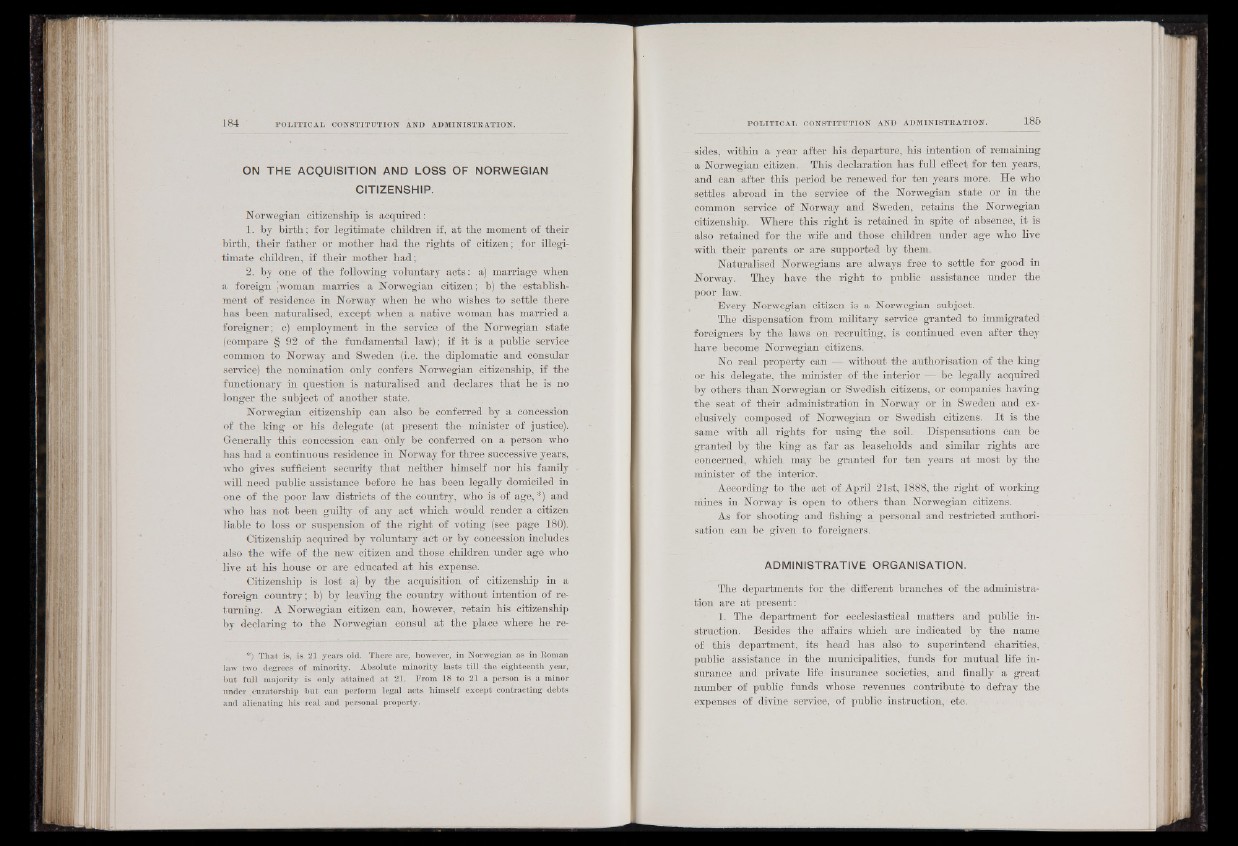
ON THE ACQUISITION AND LOSS OF NORWEGIAN
CITIZENSHIP.
Norwegian citizenship is acquired:
1 by birth; for legitimate children if, at the moment of their
birth, their father or mother had the rights of citizen; for illegitimate
children, if their mother, had;
2. by one of the following voluntary acts: a) marriage when
a foreign ¡woman marries a Norwegian citizen; b) the establishment
of residence in Norway when he who wishes to settle there
has been naturalised, except when a native woman has married a
foreigner; c) employment in the service of the Norwegian state
(compare § 92 of the fundamental law); if it is a public service
common to Norway and Sweden (i.e. the diplomatic and consular
service) the nomination only confers Norwegian citizenship, if the
functionary in question is naturalised and declares that he is no
longer the subject of another state.
Norwegian citizenship can also be conferred by a concession
of the king or his delegate (at present the- minister of justice).
Generally this concession can only be conferred on a person who
has had a continuous residence in Norway for three successive years,
who gives sufficient security that neither himself nor Ms family
will need public assistance before he has been legally domiciled in
one of the poor law districts of the country, who is of age, *) and
who has not been guilty of any act wMch would render a citizen
liable to loss or suspension of .the right of voting (see page 180).
CitizensMp acquired by voluntary act or by concession includes
also the wife of the new citizen and those children under age who
live at his house or are educated, at Ms expense.
Citizenship is lost a) by the acquisition of citizenship in a
foreign country; b) by leaving the country without intention of returning.
A Norwegian citizen can, however, retain his citizensMp
by declaring to the Norwegian consul at the place where he re*)
That is, is. .21 years old. There are, however, in Norwegian as in Eoman
law two degrees oi minority. Absolute minority lasts till -the eighteenth year,
but full majority is only attained at 21. From 18 to 21 a person is a minor
under curatorship b u t can perform legal acts himself except contracting debts
and alienating his real and personal property.
sides, within a year after his departure, his intention of remaimng
a Norwegian citizen. TMs declaration has full effect for ten years,
and can after this period be renewed for ten years more. He who
settles abroad in the service of- the Norwegian state, or in the
common service of Norway and Sweden, retains the Norwegian
citizenship. Where this right is retained in spite of absence, it is
also retained for the wife and those cMldren under age who live
with their parents or are supported by them.
Naturalised Norwegians are always free to settle for good in
Norway. They have the right to public assistance under the
poor law.
Every Norwegian citizen is a Norwegian subject.
The dispensation from military service granted to immigrated
foreigners by the laws on recruiting, is continued even after they
have become Norwegian jsitizens.
No real property can B- without the authorisation of the Mng
or Ms delegate, the minister of the interior|lgpbe legally acquired
by others than Norwegian or Swedish citizens, or companies having
the seat of their administration in Norway or in Sweden and exclusively
composed of Norwegian or Swedish citizens. I t is the
same with all rights, for using the soil. Dispensations can be
granted by the king as far as leaseholds, and similar rights are
concerned, wMch may be granted for ten years at most by the
minister of the interior.
According to the act of April 21st, 1888, the right of working
mines in Norway is open to others than Norwegian citizens.
As for shooting and fishing a personal and restricted authorisation
can be given to foreigners.
ADMINISTRATIVE ORGANISATION.
The departments for the different branches of the administration
are at present:
1. The department for ecclesiastical matters and public instruction.
Besides the affairs which are indicated by the name,
of this department, its head has also to superintend charities,
public assistance in the municipalities, funds for mutual life insurance
and private life insurance societies, and finally a great
number of public funds whose revenues contribute to defray the
expenses of divine service, of public instruction, etc.